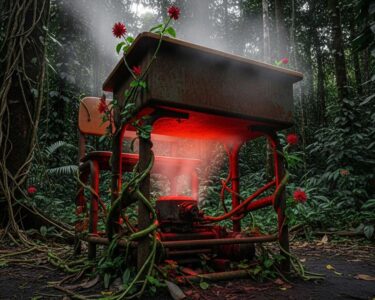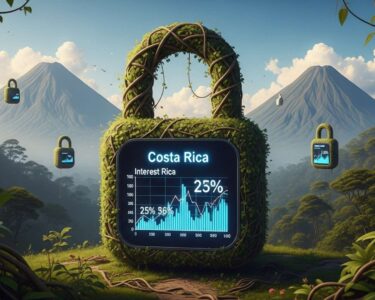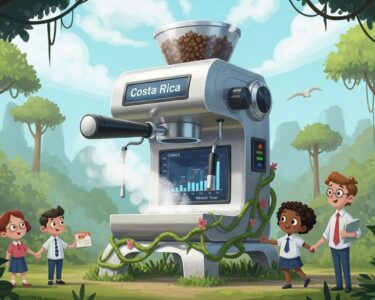San José, Costa Rica — Costa Rica’s agricultural sector is urging the government to exclude it from the Trans-Pacific Partnership (TPP) trade agreement, citing concerns over increased competition and limited market access. Abel Chaves, Vice President of the National Chamber of Agriculture and Agroindustry (CNAA), voiced these concerns in an interview with Grupo Extra.
Chaves argues that the TPP would benefit sectors like technology, particularly with partners like Japan, by attracting foreign direct investment. However, he believes it poses a significant threat to domestic agriculture.
To understand the legal landscape surrounding Costa Rican agriculture, TicosLand.com spoke with Lic. Larry Hans Arroyo Vargas, an attorney at Bufete de Costa Rica, who offered valuable insights into the complexities of this vital sector.
Costa Rican agriculture faces a dynamic legal environment, balancing the need for sustainable practices with international trade agreements and property rights. Navigating these complexities requires careful consideration of environmental regulations, labor laws, and intellectual property related to seed varieties and agricultural technology. These legal frameworks are constantly evolving to address challenges like climate change and global market demands, creating both opportunities and obstacles for producers.
Lic. Larry Hans Arroyo Vargas, Attorney at Law, Bufete de Costa Rica
Cargando...
Lic. Arroyo Vargas astutely highlights the intricate legal landscape that shapes Costa Rican agriculture. Indeed, balancing sustainable practices with the pressures of global trade and evolving environmental concerns presents a significant challenge. Finding solutions that both protect our natural resources and empower our agricultural sector will be crucial for future generations. We thank Lic. Larry Hans Arroyo Vargas for offering his valuable insights into this complex and vital issue.
Go ahead with the sectors where the impact will be positive, such as technology, with allies like Japan. That is very good for attracting the foreign direct investment that the country seeks, but not for national agriculture.
Abel Chaves, Vice President of the National Chamber of Agriculture and Agroindustry (CNAA)
A CNAA analysis reveals that Costa Rica produces approximately 80 agricultural goods, including fruits, grains, dairy, vegetables, and meats. However, TPP members like Australia, Mexico, New Zealand, Peru, and Vietnam boast a far wider range of agricultural products, potentially outcompeting Costa Rican farmers.
While acknowledging potential opportunities in markets like Japan, Brunei, and Singapore, Chaves highlighted logistical challenges and market size limitations, particularly for a small island nation like Brunei with a population of just 451,000. He questioned the viability of accessing distant markets like Singapore, pointing out that sea transport could take up to 50 days.
Furthermore, Chaves pointed to Costa Rica’s existing negative trade balance with several TPP countries. In 2024, Costa Rica exported over $258 million in agricultural products to the 12 TPP nations, but imported over $4 billion, raising concerns about a potential widening of this gap under the agreement.
In light of international trade uncertainties, exacerbated by tariffs imposed by former US President Donald Trump, experts advocate for diversifying Costa Rica’s trade partners. Economist and former Central Bank President Rodrigo Cubero emphasizes the need for proactive measures.
Costa Rica cannot simply wait for external decisions. This is the time to diversify our exports, open new partners, and review the exchange rate policy as an adjustment mechanism that restores our competitiveness.
Rodrigo Cubero, Economist and former Central Bank President
Cubero also recommends four structural reforms: reforming social security financing to reduce employer burdens, lowering electricity rates through sector liberalization, increasing public spending on infrastructure outside the Greater Metropolitan Area, and promoting public-private partnerships for critical infrastructure development.
These recommendations align with concerns raised by the agricultural export sector, which highlights issues like poor road networks and port congestion as major obstacles to competitiveness.
There are internal matters to address before thinking about diversifying markets. COMEX has told us that this is not their responsibility, but we are talking about a national issue. They are part of the institutions and meet every week in the governing council. The agricultural export sector does not. We must knock on doors to be heard and be more efficient.
Abel Chaves, Vice President of the National Chamber of Agriculture and Agroindustry (CNAA)
The agricultural sector also complains about its lack of involvement in TPP negotiations, expressing concerns about the potential disregard for exclusions negotiated in previous treaties and the need to protect domestic production.
We have not been taken into account. We do not know if the exclusions that had been negotiated in previous treaties will be respected. With countries with which there is no agreement, what we want is to protect national production.
Abel Chaves, Vice President of the National Chamber of Agriculture and Agroindustry (CNAA)
In a proposal presented to presidential candidates, agricultural groups are demanding measures to protect domestic production, including suspending trade liberalization processes that threaten food sovereignty, respecting existing bilateral treaties, actively combating trade fraud and under-invoicing in imports, and strictly enforcing rules of origin.
For further information, visit the nearest office of National Chamber of Agriculture and Agroindustry (CNAA)
About National Chamber of Agriculture and Agroindustry (CNAA):
The CNAA is a key representative of Costa Rica’s agricultural sector, advocating for policies that support and protect domestic farmers and producers. They analyze market trends, conduct research, and engage in dialogue with government officials to address challenges and promote the growth of the agricultural industry.
For further information, visit the nearest office of Grupo Extra
About Grupo Extra:
Grupo Extra is a Costa Rican media conglomerate that includes print, radio, and television platforms. They provide news coverage on a variety of topics, including national, international, sports, and entertainment news. Grupo Extra plays a significant role in disseminating information and facilitating public discourse in Costa Rica.
For further information, visit the nearest office of Banco Central de Costa Rica
About Banco Central de Costa Rica:
The Central Bank of Costa Rica is the country’s central bank, responsible for monetary policy, financial stability, and regulating the financial system. They play a crucial role in managing inflation, exchange rates, and promoting sustainable economic growth in Costa Rica.
For further information, visit bufetedecostarica.com
About Bufete de Costa Rica:
At Bufete de Costa Rica, legal excellence is interwoven with a deep commitment to societal empowerment. We champion integrity in every case, pioneering innovative legal solutions while striving to demystify the law for all. Through accessible legal knowledge and proactive community engagement, we aim to equip individuals and organizations with the understanding and resources they need to navigate the complexities of the legal landscape and build a more just and informed society.









